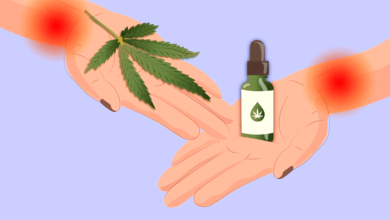CBD vs Traditional Painkillers: A Safer Alternative?
This article delves into the comparison of CBD vs Traditional Painkillers, analyzing their mechanisms, benefits, risks, and overall efficacy to help them.

Chronic pain affects millions of people globally, prompting a growing interest in alternative solutions that are not only effective but also safer for long-term use. In recent years, cannabidiol (CBD), a non-psychoactive compound derived from the cannabis plant, has gained widespread attention. This article delves into the comparison of CBD vs Traditional Painkillers, analyzing their mechanisms, benefits, risks, and overall efficacy to help readers make an informed decision.
Understanding the Basics: What Are Traditional Painkillers?
Traditional painkillers, also known as analgesics, are medications used to alleviate different types of pain. These include over-the-counter (OTC) drugs like acetaminophen (Tylenol) and nonsteroidal anti-inflammatory drugs (NSAIDs) such as ibuprofen and aspirin. Prescription painkillers include opioids like oxycodone, hydrocodone, and morphine.
Mechanism of Action
Traditional painkillers work by interacting with the body’s central nervous system to block pain signals or reduce inflammation. For example:
- NSAIDs inhibit enzymes called cyclooxygenases (COX-1 and COX-2) to reduce inflammation.
- Acetaminophen is believed to block pain by acting on the brain’s pain perception centers.
- Opioids bind to specific receptors in the brain and spinal cord to block pain messages.
What is CBD?
CBD (Cannabidiol) is one of over 100 cannabinoids found in the Cannabis sativa plant. Unlike THC (tetrahydrocannabinol), CBD does not produce a “high.” It has been extensively studied for its potential therapeutic effects, especially in managing chronic pain, anxiety, and inflammation.
Mechanism of Action
CBD interacts with the body’s endocannabinoid system (ECS), which plays a crucial role in regulating pain, mood, immune response, and sleep. Unlike opioids and NSAIDs, CBD modulates pain by influencing ECS receptors like CB1 and CB2 and enhancing the body’s natural pain control mechanisms.
CBD vs Traditional Painkillers: Effectiveness in Pain Management
When discussing CBD vs Traditional Painkillers, it is essential to assess their effectiveness across various types of pain:
Acute vs Chronic Pain
- Traditional Painkillers: Generally more effective for acute pain due to their fast action. Opioids, in particular, are potent for post-surgical and injury-related pain.
- CBD: Better suited for chronic pain management. Studies suggest it can significantly reduce pain in conditions like arthritis, fibromyalgia, and multiple sclerosis.
Inflammatory Pain
- Traditional Painkillers: NSAIDs are highly effective in reducing inflammation.
- CBD: Shows strong anti-inflammatory properties without the gastrointestinal side effects often associated with NSAIDs.
Neuropathic Pain
- Traditional Painkillers: Often less effective and may require high doses, increasing the risk of side effects.
- CBD: Research indicates that CBD is particularly promising for neuropathic pain, often caused by nerve damage or conditions like diabetes.
CBD vs Traditional Painkillers: Safety and Side Effects
Safety is a crucial aspect in the debate of CBD vs Traditional Painkillers.
Side Effects of Traditional Painkillers
- NSAIDs: Long-term use can lead to ulcers, kidney damage, and increased risk of heart attack.
- Acetaminophen: Overuse can cause liver damage.
- Opioids: High risk of addiction, overdose, constipation, and respiratory depression.
Side Effects of CBD
CBD is generally well-tolerated. Possible side effects include:
- Fatigue
- Changes in appetite
- Diarrhea
- Interaction with other medications
Unlike opioids, CBD has no addictive properties and does not cause a high, making it a safer long-term option for many users.
Legal and Regulatory Landscape
The legal status of CBD vs Traditional Painkillers varies significantly.
Traditional Painkillers
These are FDA-approved and widely available, though opioids are now tightly regulated due to the opioid crisis.
CBD
CBD derived from hemp (with less than 0.3% THC) is federally legal in the U.S., but regulations can vary by state. It is not yet FDA-approved for general pain relief, although Epidiolex, a CBD-based drug, is approved for epilepsy.
Accessibility and Cost Comparison
- Traditional Painkillers: Typically covered by insurance; readily available in pharmacies.
- CBD: Often not covered by insurance; available in various forms such as oils, creams, capsules, and edibles.
While CBD may be more expensive upfront, the reduced need for additional medications and side effect treatments could make it cost-effective in the long run.
Drug Interactions and Contraindications
Understanding how each treatment interacts with other medications is vital.
- Traditional Painkillers: Known to interact with blood thinners, alcohol, and other CNS depressants.
- CBD: Can inhibit cytochrome P450 enzymes, potentially affecting the metabolism of other drugs like anticoagulants and anticonvulsants.
Always consult a healthcare provider before combining CBD with other medications.
Public Perception and Cultural Acceptance
- Traditional Painkillers: Long-established and trusted by the medical community.
- CBD: Initially met with skepticism due to its association with cannabis, but gaining acceptance as research supports its benefits.
The shift in public perception plays a key role in the increasing adoption of CBD for pain management.
Scientific Research and Evidence
Numerous studies support both treatment modalities.
- Traditional Painkillers: Extensively researched, with well-documented efficacy and risks.
- CBD: Emerging research shows promise, though more large-scale, long-term studies are needed.
Some key studies include:
- A 2020 review published in Frontiers in Pharmacology found that CBD significantly reduced chronic pain and improved sleep.
- A 2018 study in the Journal of Pain Research indicated CBD could reduce pain and improve quality of life in people with chronic conditions.
Patient Testimonials and Anecdotal Evidence
Many individuals have shared positive experiences using CBD to manage pain, especially when traditional painkillers proved inadequate or caused adverse effects.
Formulations and Methods of Administration
- Traditional Painkillers: Mostly oral tablets, injectable forms for acute care.
- CBD: Available in oils, tinctures, topicals, edibles, and vapes. Topicals are especially popular for localized pain.
This flexibility allows patients to choose a delivery method that suits their lifestyle and type of pain.
Holistic and Integrative Approaches
Many health practitioners now incorporate CBD into integrative treatment plans alongside physical therapy, acupuncture, and lifestyle changes, enhancing overall pain management strategies.
CBD vs Traditional Painkillers: The Verdict
So, is CBD a safer alternative to traditional painkillers? The answer depends on the individual and the type of pain. For chronic, inflammatory, and neuropathic pain, CBD offers a compelling alternative with fewer risks of addiction and long-term side effects. For acute or post-surgical pain, traditional painkillers might still be the preferred option.
Final Thoughts
The debate of CBD vs Traditional Painkillers reflects a broader movement toward safer, more holistic pain management solutions. As research evolves and public perception shifts, CBD continues to emerge as a viable, less risky option for those seeking relief without the baggage of addiction or severe side effects.
However, it’s essential to approach any treatment plan under the guidance of a qualified healthcare provider. The synergy between modern medicine and natural alternatives like CBD may pave the way for more comprehensive and individualized pain management solutions in the future.









